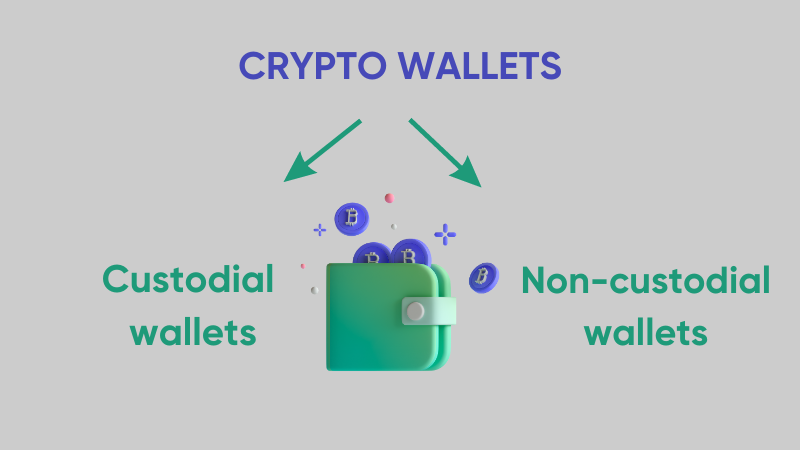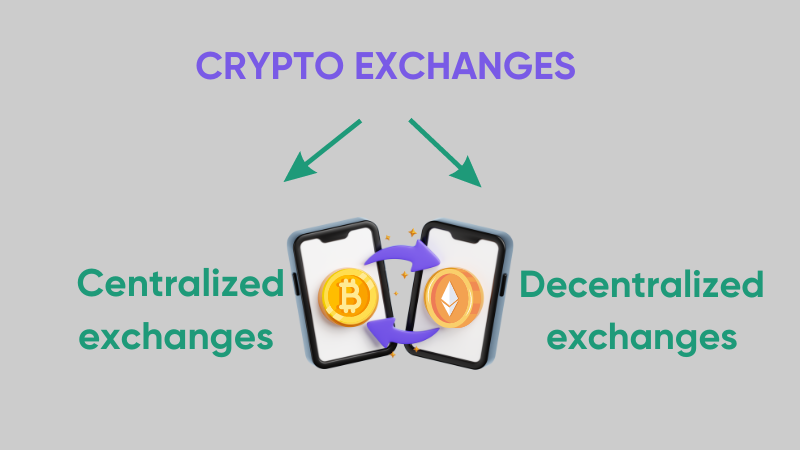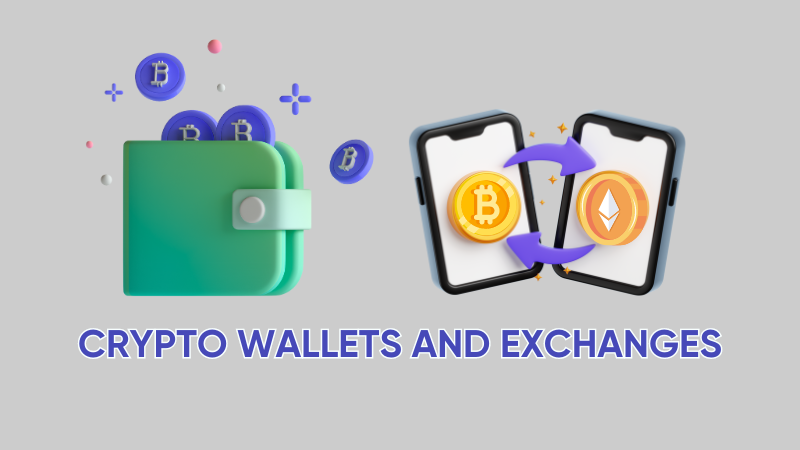Crypto wallets and exchanges are very important when discussing crypto. Crypto wallets keep your digital money safe, and exchanges are like online stores for trading cryptocurrencies.
In this article, we discuss the types of crypto wallets and crypto exchanges and provide examples for each category.
What Are Crypto Wallets?
A crypto wallet is like a digital safe for your cryptocurrencies. It keeps your private keys safe, which are secret codes that let you access and manage your crypto money.
There are two main types of wallets: custodial and non-custodial.

Custodial wallets are managed by others, like exchanges. They’re easy to use, but you might lose your money if the platform gets hacked.
Non-custodial wallets give you full control. They’re safer, but they need more technical knowledge.
Crypto wallets can also be online (hot) or offline (cold).
Pros and Cons of Crypto Wallets
Pros
- Keeps your money safe from hackers.
- You manage your money without depending on others.
- Lets you hold different cryptocurrencies.
- Easy to access your money using apps.
Cons
- You’re responsible for keeping your private keys safe.
- Needs some tech skills to set up and use.
- If you lose your keys, you might lose your money.
- There’s not much protection if something goes wrong.
Custodial Wallets
Custodial wallets are like digital pockets for your cryptocurrencies, but someone else holds onto them for you. It’s like giving your money to a friend to hold onto for safekeeping. These wallets are easy to use because you don’t have to worry about managing your money.
But just like with your friend, if something happens to the place where your money is stored, like if it gets hacked, there’s a risk that you might lose your money. So, while custodial wallets are convenient, they come with a trade-off regarding security.
Non-Custodial Wallets
Non-custodial wallets are like digital safes for your cryptocurrencies, but you’re the only one with the key. It’s similar to having a secret box where only you know the combination. With non-custodial wallets, you have complete control over your money, which means you’re responsible for keeping it safe.
These wallets are a bit trickier to set up and use than custodial ones, but they’re safer because you don’t have to rely on anyone else to keep your money secure.
So, while non-custodial wallets require a bit more effort, they give you more peace of mind knowing you’re in full control of your funds.
Hot Wallets
Hot wallets are like digital wallets always connected to the internet, just like your phone is always connected to the internet when you’re using it. It’s handy because you can access your money quickly and easily whenever needed, like keeping cash in your pocket for easy spending.
But because it’s always connected, there’s a small risk that hackers could try to get into it and steal your money. So, while hot wallets are convenient for everyday use, you must be more careful about keeping them secure.
Cold Wallets
Cold wallets are like digital safes for your cryptocurrencies that aren’t always connected to the internet. It’s similar to storing your valuables in a safe at home that’s locked away and inaccessible.
Cold wallets are great for keeping large amounts of cryptocurrency safe because they’re not vulnerable to online hacking attempts.
However, because they’re not always connected to the internet, accessing your money stored in a cold wallet might take more time and effort than a hot wallet.
So, while cold wallets offer extra security, they’re more suitable for long-term storage than quick and frequent transactions.
Examples of Crypto Wallets
- Exodus is a desktop and mobile wallet that supports a wide range of cryptocurrencies. It offers a user-friendly interface and features like built-in exchange services.
- Coinbase Wallet is a mobile wallet that allows users to securely store a variety of cryptocurrencies and tokens. It also integrates with the Coinbase exchange for easy trading.
- Ledger Nano S is a hardware wallet, which means it stores your cryptocurrencies offline on a physical device. It’s known for its security features and support for multiple cryptocurrencies.
- Trezor is another popular hardware wallet that provides a high level of security for storing cryptocurrencies. It offers a simple interface and supports a wide range of digital assets.
- MetaMask is a browser extension wallet that allows users to interact with decentralized applications (DApps) on the Ethereum blockchain. It’s widely used for managing Ethereum-based tokens and assets.
- Trust Wallet is a mobile wallet that supports a variety of cryptocurrencies and tokens. It’s known for its user-friendly interface and integration with decentralized exchanges for easy trading.
Crypto Exchanges
A crypto exchange is like an online shop for buying, selling, and trading cryptocurrencies. Also, you can read about the best crypto trading strategies. There are two types of crypto exchanges: centralized and decentralized.

Centralized exchanges (CEXs) are run by companies. They’re easy to use but can be less safe.
Decentralized exchanges (DEXs) work without a central authority. They’re safer but can be tricky to use.
When picking an exchange, think about security, fees, the coins they support, and how easy it is to use.
Pros and Cons of Crypto Exchanges
Pros
- Easy to trade different cryptocurrencies.
- Lots of trading happening, so you can quickly buy or sell.
- Some exchanges offer extra features for experienced traders.
- Good exchanges help you if you have questions or problems.
Cons
- They can get hacked, and you might lose your money.
- Some exchanges need your info, which isn’t very private.
- They charge you for trading, withdrawing, or depositing.
Centralized exchanges (CEXs)
Centralized exchanges (CEXs) are like digital marketplaces where you can buy, sell, and trade cryptocurrencies, like online stores where you can buy things. These exchanges are run by companies, and they hold onto your money for you while you’re trading.
It’s like having a bank where you keep your money safe. Centralized exchanges are easy to use because they handle everything for you, making buying and selling cryptocurrencies simple.
However, companies run them, so there’s a small risk of hacking or other issues that could impact your money. While centralized exchanges make trading convenient, you should stay aware of the potential risks.
Decentralized exchanges (DEXs)
Decentralized exchanges (DEXs) are like digital marketplaces where you can trade cryptocurrencies directly with other users without any company or middleman involved. It’s a bit like a peer-to-peer marketplace where you can buy and sell things directly with other people, without needing a store in between.
In a decentralized exchange, you’re always in control of your money, and you don’t have to trust anyone else to hold onto it for you. This makes decentralized exchanges more secure because there’s no single point of failure that hackers can target.
However, decentralized exchanges can be more complex than centralized ones, and they might not have as many features or trading options.
In fact, while decentralized exchanges offer more security and independence, they may require a bit more effort to use effectively.
Examples of Crypto Exchanges
- Binance is one of the world’s largest and most popular cryptocurrency exchanges. It offers various trading pairs, advanced trading features, and competitive fees.
- Coinbase is a user-friendly cryptocurrency exchange that caters to beginners and experienced traders. Coinbase provides a simple interface for buying, selling, and storing cryptocurrencies like Bitcoin, Ethereum, etc.
- Kraken is a well-established cryptocurrency exchange known for its security measures and wide range of supported cryptocurrencies. It offers advanced trading options and features like margin trading and futures contracts.
- Bitfinex is a cryptocurrency exchange that provides advanced trading tools and features for experienced traders. It offers a wide range of trading pairs and liquidity for various cryptocurrencies.
- Huobi is a global cryptocurrency exchange offering diverse trading services, including spot trading, futures trading, and decentralized finance (DeFi) products. It’s known for its strong liquidity and competitive fees.
- OKEx is a cryptocurrency exchange that provides a comprehensive suite of trading services, including spot trading, futures trading, and options trading. It offers a wide range of cryptocurrencies and trading pairs.
Final Thoughts on Crypto Wallets and Exchanges
Custodial wallets are easier but riskier if hacked, while non-custodial ones are safer but need more tech knowledge. Wallets can be online (hot) or offline (cold). Examples include Exodus, Coinbase Wallet, Ledger Nano S, Trezor, MetaMask, and Trust Wallet.
Exchanges are like online stores for trading cryptocurrencies. Centralized exchanges (CEXs) are easy but less secure, while decentralized ones (DEXs) are safer but trickier. Examples are Binance, Coinbase, Kraken, Bitfinex, Huobi, and OKEx.
Each has its pros and cons, so choose wisely.
FAQ About Crypto Wallets and Exchanges
What are crypto wallets❓
Crypto wallets store your cryptocurrencies securely. They manage your private keys, allowing you to access and manage your digital funds. There are two main types: custodial (managed by third parties) and non-custodial (you have full control).
What are crypto exchanges❓
Crypto exchanges are platforms where you can buy, sell, and trade cryptocurrencies. They come in two forms: a company manages centralized exchanges (CEXs). And decentralized exchanges (DEXs), which allow direct peer-to-peer transactions without a central authority.
What's the difference between hot and cold wallets❓
Hot wallets connect to the internet, providing convenience for frequent transactions, while cold wallets remain offline, offering enhanced security for long-term storage of digital assets.
Why choose a non-custodial wallet over a custodial one❓
Non-custodial wallets give you full control over your crypto funds and keys, providing greater security since you’re not reliant on the security measures of a third party. However, they require more technical knowledge to use effectively.
How to choose a crypto exchange❓
Consider the exchange’s security, fees, supported cryptocurrencies, and user-friendliness. Centralized exchanges are generally easier for beginners, while decentralized ones offer more security but can be more complex.




